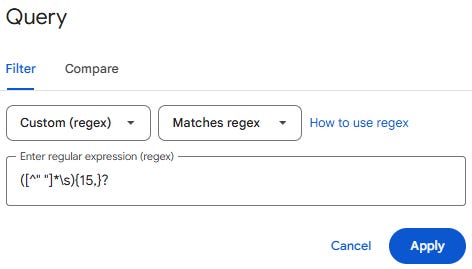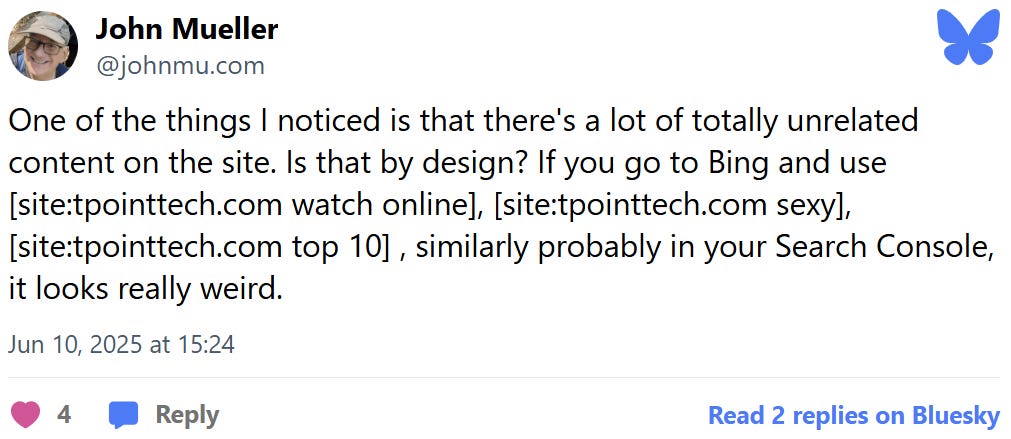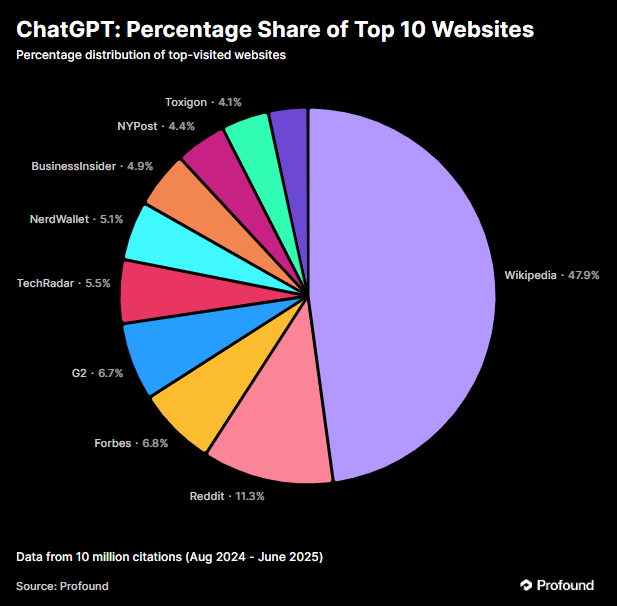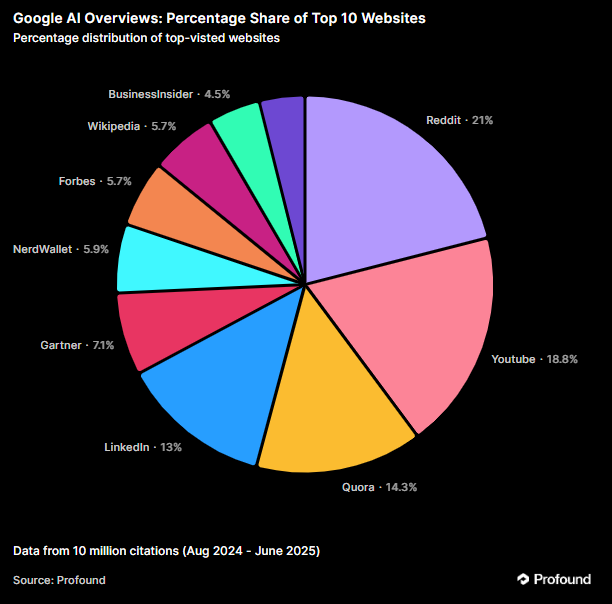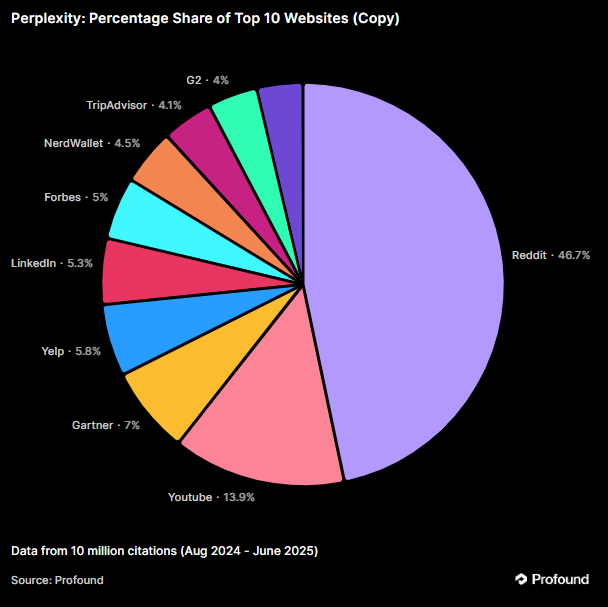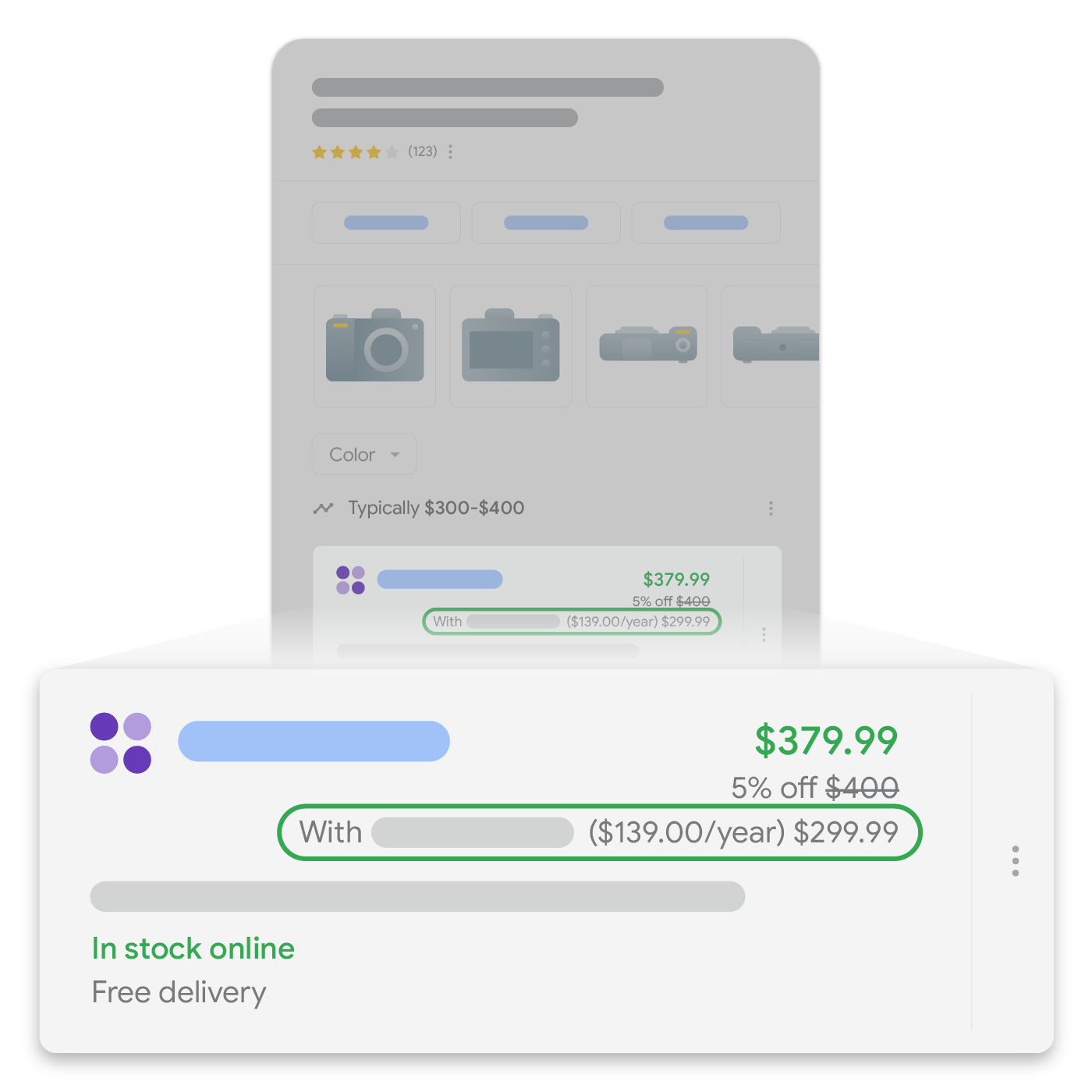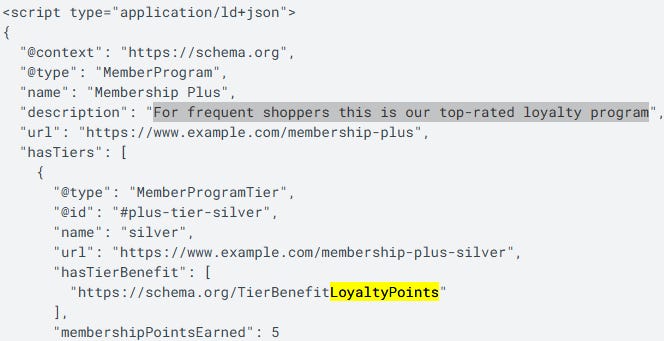Finding Conversational Queries, Where LLMs Get Their Information & The Importance of Content Relevancy
SEO TL;DR #75 16/06/2025
Content SEO
Finding Conversational Style Queries in Google Search Console
Barry Schwartz covered a few examples of how to use regex to find longer queries within GSC. This regex for instance, will filter out keywords which are at least 15 words long:
It helps find the types of queries someone would use when speaking to ChatGPT. For example:
“how to repair crack on the second floor house before putting new tiles and avoid them cracking in the future”
Combined with this regex to find queries which contain informational intent keywords (Credit to Mark Williams Cook), and you can get some decent insights into how people are finding your content.
\b(how to|guide|tutorial|step by step|tips|tricks|ways to|best way to|learn|help|explain|understand|instruction|methods|examples|meaning of|definition)\b
I added a filter to only show keywords with the word ‘crack’ in them, which returned 99 queries over the last 3 months.
💡 Takeaway: This regex helps reveal the kind of searches people do in AI mode. You can use this data to ensure your content is covering the related questions.
In the case of cracked tiles, I found an old blog which briefly covered the topic, but there were definitely enhancements to make. The extra information you add might help you get surfaced in AI search results more frequently, but more importantly, it offers better value to potential customers with that problem.
Content SEO
Google Hints: Stay in Your Lane
Covered in Search Engine Roundtable, Google’s John Mueller responded to a site owner’s ranking drop by pointing out something that’s long been suspected: publishing unrelated content can hurt your visibility.
The site in question had a mix of totally off-topic pages (like “watch online” and “top 10 sexy…” content) - a timely reminder of Google’s preference for thematic consistency.
💡Takeaway: If you’re looking for a way to analyse the similarity between pages and find any outliers (those URLs that don’t fit the norm), Screaming Frog have released this functionality in their latest update.
I haven’t had the chance to play around with it fully, but here’s a brilliant summary on what it can do by Miachel Carrico on LinkedIn.
Analyze similarity between pages: Find the closest related pages — aka, internal link opportunities 😉
Find pages that are outliers: Quickly identify URLs that don’t fit the norm. Helps decide if they’re valuable or need cleaning up.
Semantic search: Better query matching = better relevance checks. Could be helpful to confirm if the page targeting a keyword is actually the best fit - or if something else is more appropriate - or if you might need to update your page.
URL details in prompts: add crawl metrics like word count, title length, etc., into the prompt. Very simple example: "Hey GPT, here are my supposed spelling errors found on this page, anything I should be concerned about?"
Image and text-to-speech generation: Create visuals or audio content from your pages. First idea: auto-generate an audio version of every blog and embed it. Why? Because I can 🚀
SEO X AI
Where AI Gets Its Info From
Profound analysed 30 million citations from ChatGPT, Google AI Overviews and Perplexity between August 2024 and June 2025 and found:
ChatGPT cited Wikipedia nearly 48% of the time.
Google AI Overviews leaned most on Reddit (21%), then YouTube, Quora and only 5.7% Wikipedia
Perplexity relied even more on Reddit (47%)
💡 Takeaway: While SEOs have obsessed over Wikipedia for years, user-generated content (especially Reddit) is dominating the training and citation landscape in AI tools. If you want to be cited in the AI results, ensure you’re including these platforms in your marketing mix.
Technical SEO
Structured Data Clean-Up & New Support for Loyalty Markup
Google’s done some spring cleaning as part of its effort to “simplify the search results”. It’s phasing out support for several structured data types, including:
Book Actions
Course Info
Claim Review
Estimated Salary
Learning Video
Special Announcement
Vehicle Listing
These markups will stop generating enhanced displays in the search results over the coming months (though this won’t affect rankings).
At the same time, Google is adding support for loyalty program structured data. Using the ‘Organization’ and ‘Product’ schema, you can now define loyalty perks (like member-only discounts or point-earning schemes).
I wrote about how this was supported in Merchant Centre back in February, which means if you’re a retailer offering special membership pricing, you can show this directly in the SERPs:
Here’s a snippet of the code to show you what it looks like (full guide):
💡 Takeaway: Google seems to be prioritising structured data that directly enhances shopping UX. If you run a loyalty scheme and aren’t on Merchant Centre, this new schema support allows you to promote your membership benefits directly in search. It’s early days, but I’d put money on this increasing your click-through rate.
Content SEO
Lifestyle Publishers Pivot from High-Volume to High-Intent
A new Digiday report shows how lifestyle and entertainment publishers are adapting to Google's AI Overviews and the traffic losses that come with them.
Some are reporting 30–50% drops in search traffic since May 2024, especially for evergreen content that used to rank well for basic queries now answered by AI. But instead of chasing lost clicks, they’re going deeper.
💡 Takeaway: The era of churning out content to answer basic search questions is over. Successful publishers are pivoting to more personal, comparative and editorial formats that AI can’t easily replicate; e.g. POV explainers, curated lists or early breaking news.
It's a shift from volume to value, which I’ve also seen work well outside of publishing. For example, in retail, instead of writing generic content about what type of clothes complement a specific body type, we developed a quiz where users answer different questions, which leads to a list of personalised recommendations. This page converts 40% higher than a standard collection page.
If AI can answer your content in a sentence, it probably will, so lean into what it can’t do: human stories, originality, insight and brand voice.
International SEO
Google Softens Its stance on Auto-Translated Content
In an update to its multilingual guidelines, Google has removed its longstanding warning about blocking automatically translated content from indexing. Previously, Google discouraged machine-translated pages, but now, with AI translations improving, their stance has shifted.
This follows coverage by Barry Schwartz and analysis by Glenn Gabe, especially around Reddit’s rollout of AI-translated content, which they claim is “sanctioned by Google”.
💡 Takeaway: Google now treats AI-translated content as fair game, as long as it’s useful and not spammy. The focus is on the quality, not the method, so if you’re expanding internationally, this opens the door to scale translations with AI, as long as the output reads naturally and adds value.
That said, don’t treat this as a green light to machine-translate your site overnight. Test it. Pair AI translation with human QA and make sure the user experience holds up across regions. Because in the end, Google cares about usefulness, not your workflow.
Content SEO
Product-led SEO in the Age of AI
runs through 3 examples of good “Product-led SEO” (a term coined by ).Unlike content-led SEO, product-led SEO scales by turning your product, user activity or inventory into indexable content. Figma do this really well with their user-generated templates, which attract a lot of long-tail traffic, even post-AI Overviews.
Kevin explains how in a world where AI Overviews dominate simple queries, product-led SEO can give you defensible content at scale. If your product generates content, index it, but be knowledgeable about the challenges it can bring, such as poor SEO hygiene, spam and site maintenance issues. Read the full article below:
PS: If you want to talk about your next project, use the link below to book a 20-minute discovery call:


